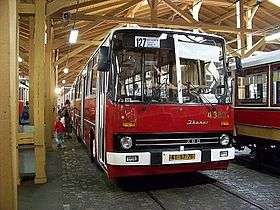Ikarus 280
| Ikarus 280 | |
|---|---|
 Historical Ikarus 280 in Prague, Czech Republic | |
| Overview | |
| Manufacturer | Ikarus |
| Body and chassis | |
| Doors | Two (Ikarus 280.10) to four (Ikarus 280.08) |
| Floor type | High-floor |
| Chassis | Semi-self-supporting with frame, inspired by VöV-1 design |
| Related |
Ikarus 256 Ikarus 260 Ikarus 293 Ikarus C80 |
| Powertrain | |
| Engine |
Rába-MAN D 2356 |
| Capacity | 160 |
| Power output | 141–184 kW |
| Transmission |
Csepel ZF 6-speed manual Voith DIWA ZF Ecomat 4HP and 5HP |
| Dimensions | |
| Length | 16,500 mm (650 in) |
| Width | 2,500 mm (98 in) |
| Height | 3,165 mm (124.6 in) |
| Curb weight | 12,580 kg (27,730 lb) |
| Chronology | |
| Predecessor | Ikarus 180 |
| Successor | Ikarus 435 |
Ikarus 280 is an articulated urban bus produced by Hungarian bus manufacturer Ikarus from 1973 to 2002.[1] It was succeeded by the Ikarus 435 in 1985.
Construction features
The Ikarus 280 is a model of the Ikarus 200 series. It is made of two rigid sections linked by a pivoting joint. The body is a semi-self-supporting body with a frame, the D 2156 engine is mounted in the front section. It powers the middle axle, meaning that the bus has puller configuration. Both rear and middle axles were made by Rába, while the front axle was made by LiAZ. Either an automatic or a manual gearbox was installed that allowed for a top speed of 75 kilometres per hour (47 mph).
Production and operation
Production started in 1973 and ended in 2002. Currently, the number of Ikarus 280 buses is getting reduced, due to supply of new low-floor buses. The trolleybus Ikarus 280 T and the articulated buses 281(RHD), 282 (18-metre-version), 283 (pusher configuration) and 284 were based on the Ikarus 280. In Prague, Ikarus 280 busses were used from 1977 until 1999. Since the beginning of 90s these buses were replaced by Karosa B 741 and later by Karosa B 941. In Bratislava, the busses were operated between 1974 and 2008. In Riga, Latvia these buses were operated from 1980s until 2005 when they were replaced by low-floor buses. Due to the simple and robust construction, the Ikarus 280 is still operated all around the world, for example in Teheran, Istanbul, Havana and Basra.
Historical vehicles
Current list of historical buses:
- Czech Republic
- private collector in Otvovice (bus ex Comett Tábor), year 1997
- Prague transport company (bus no.4382), year 1988
- Brno transport company (bus no.2090)
See also
References
| Wikimedia Commons has media related to Ikarus 280. |
- ↑ "Фото: Таджикистан, № 0171 ТТ 01 — Ikarus 280.33O — Фотобус". fotobus.msk.ru. Retrieved 15 October 2016.